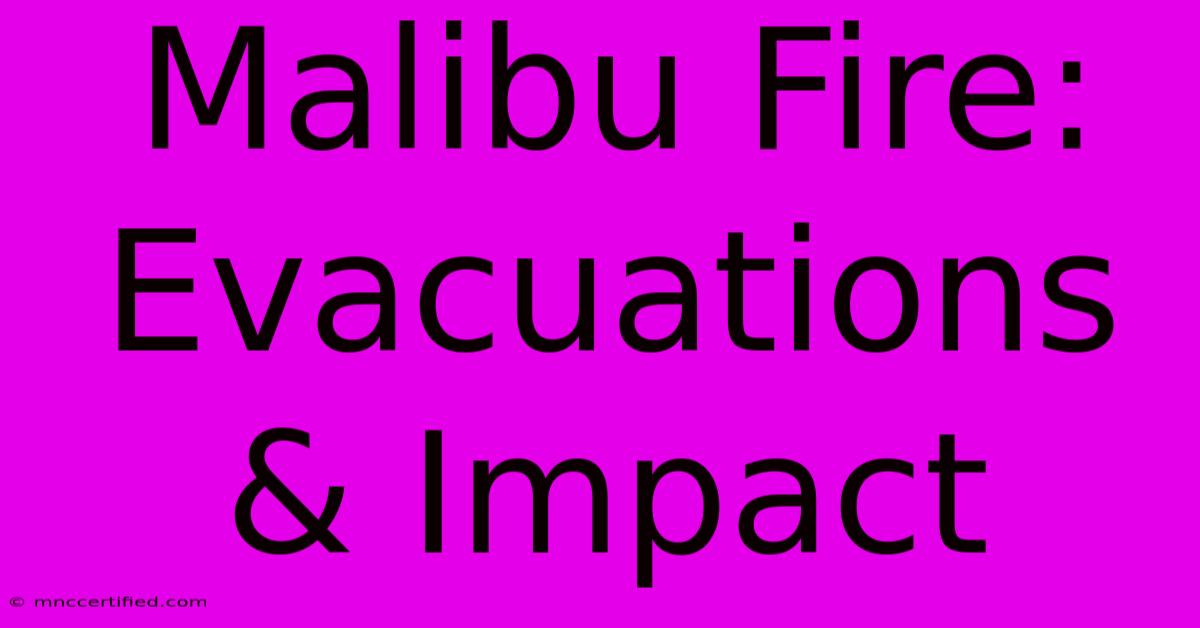Malibu Fire: Evacuations & Impact

Table of Contents
Malibu Fire: Evacuations & Devastating Impact
The relentless California wildfires have once again left their mark, with the Malibu fires causing widespread evacuations and significant environmental and economic impact. Understanding the scale of these events, their causes, and the resulting consequences is crucial for preparedness and future mitigation strategies. This article delves into the details of recent Malibu fires, focusing on evacuation procedures, the extent of damage, and the long-term repercussions.
Understanding the Malibu Fire Threat
Malibu, known for its stunning coastline and luxurious properties, is unfortunately situated in a high-risk area for wildfires. The combination of dry chaparral, Santa Ana winds, and increasingly hotter, drier summers creates a volatile environment. Several factors contribute to the intensity and frequency of these fires:
- Climate Change: Rising temperatures and prolonged drought conditions significantly increase the risk of wildfires. Drier vegetation acts as readily available fuel, leading to faster fire spread.
- Vegetation Management: Inadequate brush clearance and the build-up of dry undergrowth contribute to the rapid escalation of fires.
- Human Activity: Accidental and intentional ignitions remain a primary cause of wildfires, emphasizing the need for caution and responsible land management.
Recent Malibu Fire Evacuations: A Closer Look
Recent Malibu fires have triggered widespread evacuations, impacting thousands of residents and visitors. The speed and efficiency of evacuations vary depending on the specific incident and the preparedness of local authorities. Key aspects of the evacuation process include:
- Early Warning Systems: Effective communication through alerts, social media, and local news outlets are vital for timely evacuations.
- Evacuation Routes: Clearly marked and well-maintained evacuation routes are crucial for minimizing congestion and ensuring safe passage.
- Emergency Shelters: The availability and accessibility of emergency shelters provide refuge for displaced residents and offer essential support services.
Impact on Residents and Businesses
The impact of Malibu fires extends far beyond the immediate threat of flames. Evacuations disrupt daily life, causing significant stress and inconvenience. The consequences for residents and businesses can be severe:
- Property Loss: Homes, businesses, and valuable assets are at risk of destruction, leading to immense financial and emotional hardship.
- Displacement: Evacuations can lead to temporary or even permanent displacement, causing significant disruption to livelihoods and social networks.
- Economic Impact: The destruction of businesses and the disruption of tourism negatively impact the local economy.
The Environmental Impact: A Scar on the Landscape
Beyond the immediate human impact, Malibu fires have a devastating effect on the environment. The loss of vegetation leads to:
- Soil Erosion: Burned areas are vulnerable to erosion, leading to loss of topsoil and affecting water quality.
- Habitat Destruction: Wildfires destroy crucial wildlife habitats, threatening the survival of numerous plant and animal species.
- Air Quality Degradation: Smoke plumes from wildfires significantly reduce air quality, posing health risks to both residents and wildlife.
Long-Term Recovery and Prevention
Recovering from the devastation of a Malibu fire is a long and complex process. Efforts focus on:
- Reforestation: Replanting native vegetation helps restore the ecosystem and prevent future soil erosion.
- Community Support: Providing financial and emotional support to affected residents and businesses is crucial for long-term recovery.
- Fire Prevention Strategies: Implementing stricter regulations on brush clearance, improving early warning systems, and promoting public awareness are essential for preventing future fires.
In Conclusion:
Malibu fires pose a significant and recurring threat to the community and the environment. By understanding the contributing factors, improving evacuation procedures, and investing in long-term prevention strategies, we can strive to mitigate the devastating impact of these wildfires and safeguard the unique beauty and ecological richness of Malibu. Continuous monitoring, community engagement, and proactive measures are crucial for building resilience and ensuring a safer future for this treasured area.

Thank you for visiting our website wich cover about Malibu Fire: Evacuations & Impact. We hope the information provided has been useful to you. Feel free to contact us if you have any questions or need further assistance. See you next time and dont miss to bookmark.
Featured Posts
-
West Ham Wolves Match Live Score Update
Dec 10, 2024
-
Swifts Eras Tour A Fan Farewell
Dec 10, 2024
-
12 9 2024 Soccer Getafe Vs Espanyol Odds
Dec 10, 2024
-
Unexpected Bella Hadid Joins Yellowstone
Dec 10, 2024
-
Yellowstone Hadids Appearance Stirs Fans
Dec 10, 2024